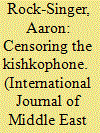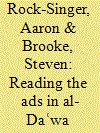| Srl | Item |
| 1 |
ID:
154658


|
|
|
|
|
| Summary/Abstract |
How do states produce religion and how can the study of state censorship cast light on this phenomenon? This article examines the logic by which two Egyptian government bodies, the Ministry of Culture and the Islamic Research Academy, censored the sermons of a premier Islamist preacher, Shaykh ʿAbd al-Hamid Kishk (d. 1999), between 1987 and 1993. To do so, it draws on two distinct sets of sources: a sixteen-volume printed edition of Kishk's sermons published in Egypt and MP3s of original performances recorded initially by audiocassette. While previous studies on religion and state power in the Middle East emphasize the strategies by which states use religion to assert their interests, this article uses the censorship of a leading antiregime preacher to probe the undertheorized distinction between claiming and producing religion. A focus on the strategies, in turn, casts light on both the internal diversity of religious visions within the Egyptian state and on the subtle, yet significant, ways in which state actors not only censor but also are shaped by their Islamist challengers.
|
|
|
|
|
|
|
|
|
|
|
|
|
|
|
|
| 2 |
ID:
176559


|
|
|
|
|
| Summary/Abstract |
This article probes the return of the Muslim Brotherhood to prominence in 1970s Egypt through a systematic analysis of advertisements in the organization’s flagship periodical, al-Daʿwa (The Call). In every issue of the magazine, which was published between June 1976 and October 1981, entreaties to proper conduct and appeals to Islamic solidarity appeared alongside advertisements for everything from Pepsi to breakfast biscuits to automobiles. We utilize the methodological insights of social and cultural historians to the value of advertisements to cast new light on the reconstruction of the Brotherhood, its relationship with the diverse institutions comprising the Egyptian state, and on how the Muslim Brotherhood’s vision of piety both reflected and challenged a changing economic reality. Moving beyond a story of the Brotherhood’s return as a product of independent Islamist enterprise that had emerged due to both the Gulf oil boom and Egypt’s economic liberalization programme, significant public sector advertising in al-Daʿwa, especially prominent across the most valuable advertising real estate, underscores both internal divisions within the Egyptian state as well as the tangible ways that various state institutions were patrons of religious change.
|
|
|
|
|
|
|
|
|
|
|
|
|
|
|
|